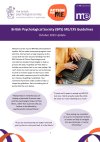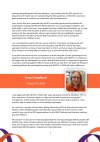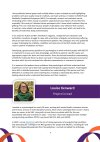Joan Crawford
Senior Member (Voting Rights)
Hi @HutanAny news @Joan Crawford?
Yes, it's work in progress. Hope to have first full draft by Easter, then it'll need editing/refining before the formal review process.
Hi @HutanAny news @Joan Crawford?
Hello,
We’re delighted to share the October 2025 update on the British Psychological Society (BPS) ME/CFS Guidelines.
Since our last update, we’ve made significant progress. The fantastic response to our survey has enabled us to secure funding from the BPS Division of Clinical Psychologists and recruit an Assistant Psychologist to help process your feedback. Your insights continue to shape the guidelines, and we’re grateful for the time and energy so many of you have given.
In this update, we introduce some of the people working on the guidelines — including psychologists and Experts by Experience. You’ll also find details about our next steps as we move towards completing the first full draft. You can read the full update in the attached PDF.
We’re deeply appreciative of the ongoing support from the ME/CFS community, charities, and professionals who share our commitment to improving psychological care for people living with ME/CFS. The guidelines will make it very clear that ME/CFS is a physical illness. The guidance is to support people with the psychological impact of living with a long-term, debilitating, physical condition.
With best wishes,
Katherine Langford (Action for ME Volunteer) and Russell Flemming (ME Association)
Expert by experience reps for the BPS (British Psychological Society) working party on the Good Practice Guidelines for working with people with ME/CFS







How would a psychologist be able to help pwME/CFS to continue working? And why would they be involved in pacing?Whilst ME/CFS is not a psychological condition, and psychology is not for everyone, many people have been helped by psychologists e.g. to cope and come to terms with the grief, to learn to pace and rest or to find ways to continue working.
How would a psychologist be able to help pwME/CFS to continue working? And why would they be involved in pacing?
I suppose a counsellor could help someone express their needs in the workplace or accept a lower level role that allows working from home? They might help someone truly acknowledge the constraints they have, and so not keep overdoing things. They might help someone feel better able to explain to others in their life, their spouse, their children, their parents, why they can't do as much as they would like to, and so reduce the pressure on them to exceed their capability for activity.How would a psychologist be able to help pwME/CFS to continue working? And why would they be involved in pacing?
They're a recognised professional who could help argue for reasonable adaptations under the law. I wouldn't have got half what I needed to stay in work without this (though in my case it was an occupational therapist).How would a psychologist be able to help pwME/CFS to continue working?
Because most of us struggle hugely with pacing, and some might benefit from support from a psychologist or counsellor. Guilt is a really common reason for people not giving themselves the recovery time they need, and a lot of it is self-imposed.And why would they be involved in pacing?
My psychologist is brilliant, mostly because she doesn’t really use any frameworks (other than something that basically amounts to «it might help talking about it»), and everything else is «this is one way to look a things, does that resonate with you», with me responding «not really, this is more what it feels like» and that helps me explore different topics that I find useful.But what do you do if you have trained as a psychologist and realise that you are more likely to help people just by experience with how people cope rather than by theory? I sense that the group writing this are doing their best to deliver what might help. It is just that jargon creeps in everywhere in life.
An OT could also do that, with more credibility and less stigma.I suppose a counsellor could help someone express their needs in the workplace or accept a lower level role that allows working from home?
Sure, but so could a nurse or a doctor or an OT. There’s no need for psychology, only compassion, authority (in the eyes of others), and a decent understanding of the basics of ME/CFS (if you learn the factsheets by heart you’re set).They might help someone truly acknowledge the constraints they have, and so not keep overdoing things. They might help someone feel better able to explain to others in their life, their spouse, their children, their parents, why they can't do as much as they would like to, and so reduce the pressure on them to exceed their capability for activity.
Yes, that is my main hope with this. (Just noting the confusing duplication of acronyms - Bio-Psycho-Social (aka the psychogenic paradigm) and British Psychological Society - for people new to these conversations.)Although I guess this kind of psychology is much better than the BPS crap, so it might at least help avoid some harm.
But we do have a problem, a huge one: people are not believed by most healthcare professionals. We desperately need solutions to it.This feels like a solution looking for a problem, not someone looking at the problem and trying to find the best solution.
Thanks, I’ve edited to clarify.(Just noting the confusing duplication of acronyms - Bio-Psycho-Social (aka the psychogenic paradigm) and British Psychological Society - for people new to these conversations.)
Yes, these are problems but I don’t think they are best solved by psychologists.But we do have a problem, a huge one: people are not believed by most healthcare professionals. We desperately need solutions to it.
I don't care what the person's specialism is if they understand my disability, offer me appropriate advice, and are prepared to help if I need supportive testimony to access appliances, work adaptations, benefits, housing, etc. I've had to argue for all of those things, and none of the evidence has been provided by a doctor. It's always been other professionals.
I’d much rather have a skilled nurse do that, maybe with an OT as well. Because they can answer medical questions as well. We don’t need all of the extra bits from the psychologists.Where there are significant difficulties in adapting to the illness and the need for pacing, psychologists or counsellors are the best fit anyway.
I agree that on the menu of what across all of the psychology options (not all can offer all of these) that CBT is the most inappropriate, and is likely to be a harmful match even if it were pushing the 'right' ideas due to the style of it (too exhausting, too much too fast, too confrontational but also that feeling of being violated by having to repeat back things that have been put in our mouths because we were beyond tired and unable to really feel on top of having thought about it by x mins into a session).I agree that the wording of the statement seems full of non-sequiturs. Psychologists are used to supporting people by providing a sounding board and if they have talked to lots of other people with ME/CFS or even have it themselves then they might be quite useful in that regard.
But since we have no valid psychological theoretical base for anything here there does seem to be a disconnect. She says 'psychology is not for everyone' - well yes, we don't want psychology here, just being used to talking to people sympathetically. And 'coming to terms with grief' sounds suspiciously like something you do according to a psychology recipe, which I would run a mile from. Learning to pace isn't psychology as far as I can see.
I rather wish that it was made clear that 'counselling' might be useful but that there is no place for 'psychology', which implies theory and there are no valid theories here.
But what do you do if you have trained as a psychologist and realise that you are more likely to help people just by experience with how people cope rather than by theory? I sense that the group writing this are doing their best to deliver what might help. It is just that jargon creeps in everywhere in life.
I think it is worth us noting that there are very different capabilities across different types of professionals.But we do have a problem, a huge one: people are not believed by most healthcare professionals. We desperately need solutions to it.
I don't care what the person's specialism is if they understand my disability, offer me appropriate advice, and are prepared to help if I need supportive testimony to access appliances, work adaptations, benefits, housing, etc. I've had to argue for all of those things, and none of the evidence has been provided by a doctor. It's always been other professionals.
Where there are significant difficulties in adapting to the illness and the need for pacing, psychologists or counsellors are the best fit anyway.
So would I, but the reality is that we haven't got them. It seems we have got some informed psychologists, and support with adapting to pacing could genuinely be of value to those struggling. For some mild and moderately affected people a year or more into their illness, it might be the only intervention they need apart from access to a GP. As pacing is so crucial and GPs have little or nothing to offer, it could also be the most helpful.I’d much rather have a skilled nurse do that, maybe with an OT as well. Because they can answer medical questions as well. We don’t need all of the extra bits from the psychologists.
